BSC Business Management Business Law Assignment: 2021/22
VerifiedAdded on 2023/06/09
|8
|2557
|132
Homework Assignment
AI Summary
This assignment, prepared for a BSC (Hons) Business Management program, delves into the intricacies of UK business law. It addresses three key questions: the arrangement of the UK's legal system, including its classification into public and private law, municipal and international law, and common law versus equity; the sources of law, with a focus on legislation and European Union Law; and the direct impact of the UK law-making process, particularly contract law, on commercial organizations. The assignment highlights the importance of understanding the rule of law, the different legal systems within the UK, and the essential elements of contract law, such as agreement, contractual intention, and consideration. The paper emphasizes the significance of adhering to legal regulations for effective and legal business operations.
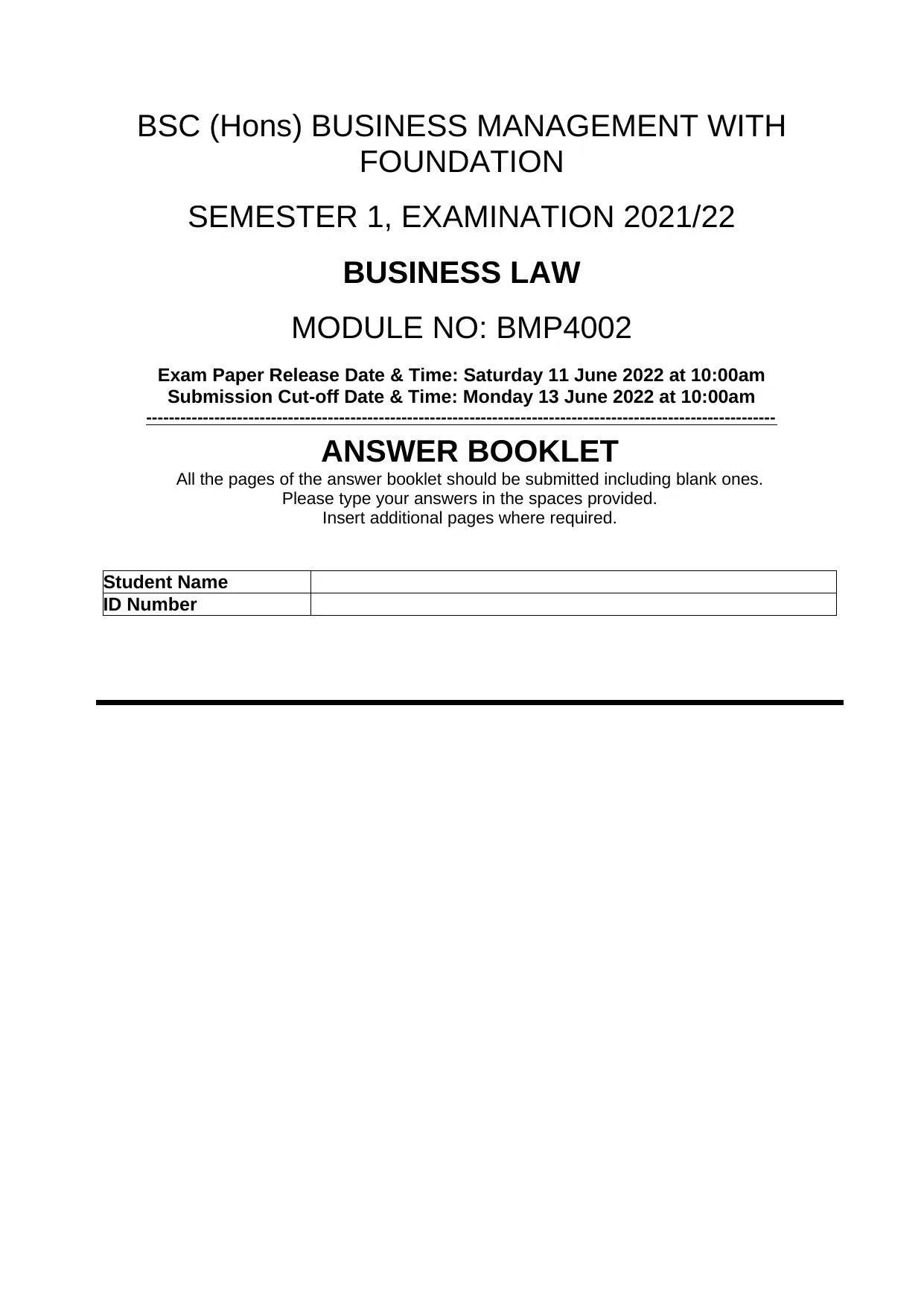
BSC (Hons) BUSINESS MANAGEMENT WITH
FOUNDATION
SEMESTER 1, EXAMINATION 2021/22
BUSINESS LAW
MODULE NO: BMP4002
Exam Paper Release Date & Time: Saturday 11 June 2022 at 10:00am
Submission Cut-off Date & Time: Monday 13 June 2022 at 10:00am
---------------------------------------------------------------------------------------------------------------
ANSWER BOOKLET
All the pages of the answer booklet should be submitted including blank ones.
Please type your answers in the spaces provided.
Insert additional pages where required.
Student Name
ID Number
FOUNDATION
SEMESTER 1, EXAMINATION 2021/22
BUSINESS LAW
MODULE NO: BMP4002
Exam Paper Release Date & Time: Saturday 11 June 2022 at 10:00am
Submission Cut-off Date & Time: Monday 13 June 2022 at 10:00am
---------------------------------------------------------------------------------------------------------------
ANSWER BOOKLET
All the pages of the answer booklet should be submitted including blank ones.
Please type your answers in the spaces provided.
Insert additional pages where required.
Student Name
ID Number
Paraphrase This Document
Need a fresh take? Get an instant paraphrase of this document with our AI Paraphraser
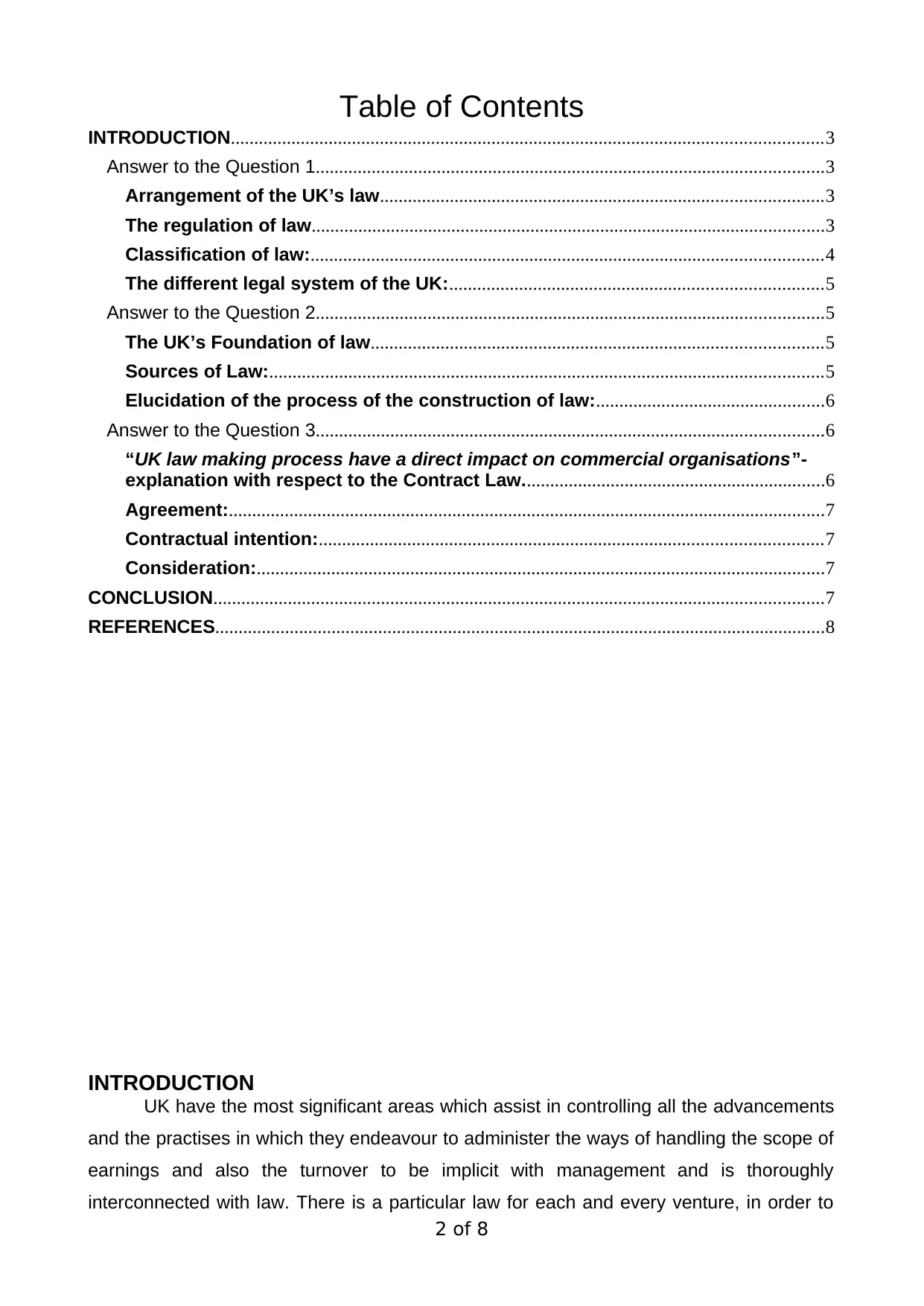
Table of Contents
INTRODUCTION...............................................................................................................................3
Answer to the Question 1.............................................................................................................3
Arrangement of the UK’s law...............................................................................................3
The regulation of law..............................................................................................................3
Classification of law:..............................................................................................................4
The different legal system of the UK:................................................................................5
Answer to the Question 2.............................................................................................................5
The UK’s Foundation of law.................................................................................................5
Sources of Law:.......................................................................................................................5
Elucidation of the process of the construction of law:.................................................6
Answer to the Question 3.............................................................................................................6
“UK law making process have a direct impact on commercial organisations”-
explanation with respect to the Contract Law.................................................................6
Agreement:................................................................................................................................7
Contractual intention:............................................................................................................7
Consideration:..........................................................................................................................7
CONCLUSION...................................................................................................................................7
REFERENCES...................................................................................................................................8
INTRODUCTION
UK have the most significant areas which assist in controlling all the advancements
and the practises in which they endeavour to administer the ways of handling the scope of
earnings and also the turnover to be implicit with management and is thoroughly
interconnected with law. There is a particular law for each and every venture, in order to
2 of 8
INTRODUCTION...............................................................................................................................3
Answer to the Question 1.............................................................................................................3
Arrangement of the UK’s law...............................................................................................3
The regulation of law..............................................................................................................3
Classification of law:..............................................................................................................4
The different legal system of the UK:................................................................................5
Answer to the Question 2.............................................................................................................5
The UK’s Foundation of law.................................................................................................5
Sources of Law:.......................................................................................................................5
Elucidation of the process of the construction of law:.................................................6
Answer to the Question 3.............................................................................................................6
“UK law making process have a direct impact on commercial organisations”-
explanation with respect to the Contract Law.................................................................6
Agreement:................................................................................................................................7
Contractual intention:............................................................................................................7
Consideration:..........................................................................................................................7
CONCLUSION...................................................................................................................................7
REFERENCES...................................................................................................................................8
INTRODUCTION
UK have the most significant areas which assist in controlling all the advancements
and the practises in which they endeavour to administer the ways of handling the scope of
earnings and also the turnover to be implicit with management and is thoroughly
interconnected with law. There is a particular law for each and every venture, in order to
2 of 8
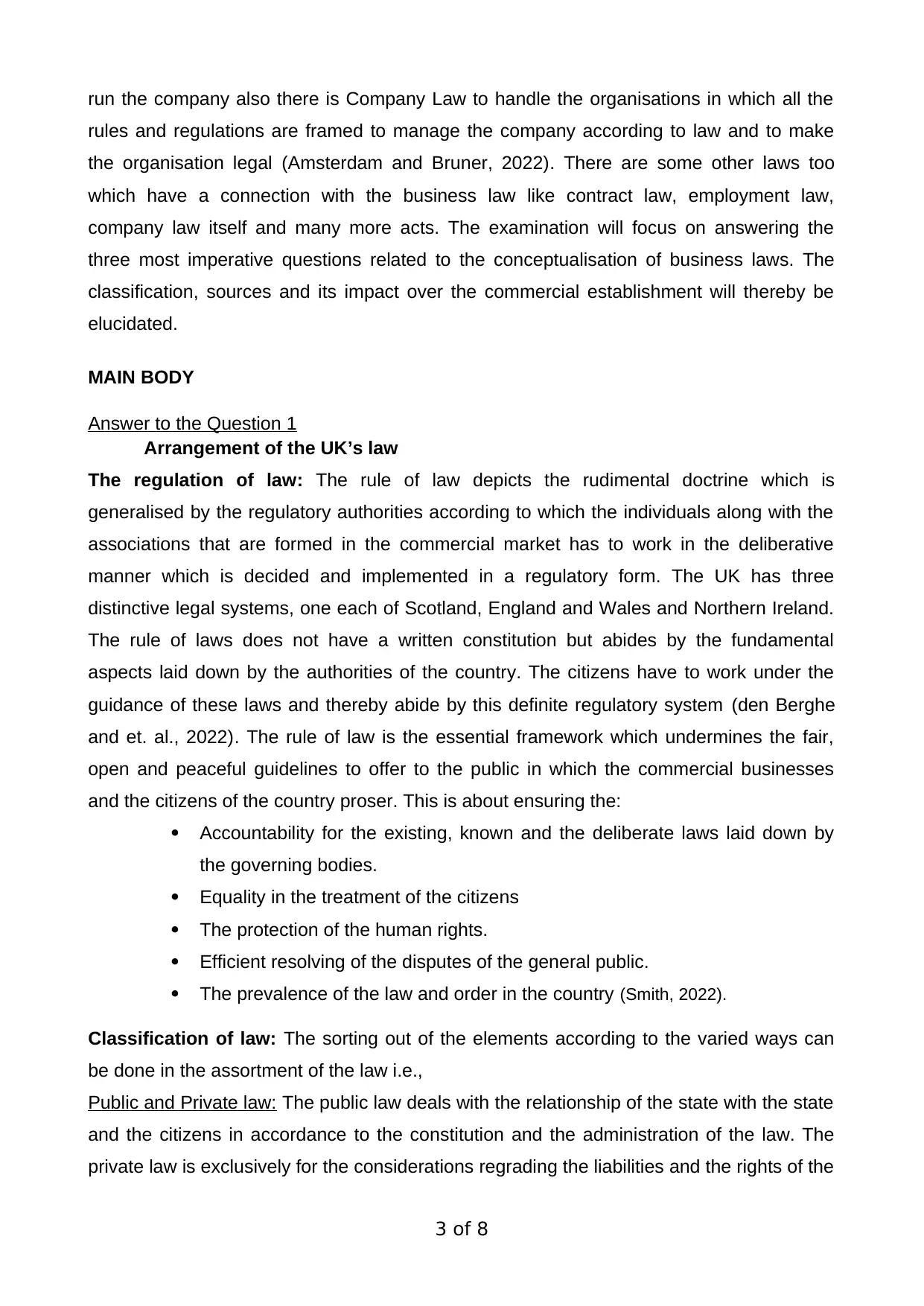
run the company also there is Company Law to handle the organisations in which all the
rules and regulations are framed to manage the company according to law and to make
the organisation legal (Amsterdam and Bruner, 2022). There are some other laws too
which have a connection with the business law like contract law, employment law,
company law itself and many more acts. The examination will focus on answering the
three most imperative questions related to the conceptualisation of business laws. The
classification, sources and its impact over the commercial establishment will thereby be
elucidated.
MAIN BODY
Answer to the Question 1
Arrangement of the UK’s law
The regulation of law: The rule of law depicts the rudimental doctrine which is
generalised by the regulatory authorities according to which the individuals along with the
associations that are formed in the commercial market has to work in the deliberative
manner which is decided and implemented in a regulatory form. The UK has three
distinctive legal systems, one each of Scotland, England and Wales and Northern Ireland.
The rule of laws does not have a written constitution but abides by the fundamental
aspects laid down by the authorities of the country. The citizens have to work under the
guidance of these laws and thereby abide by this definite regulatory system (den Berghe
and et. al., 2022). The rule of law is the essential framework which undermines the fair,
open and peaceful guidelines to offer to the public in which the commercial businesses
and the citizens of the country proser. This is about ensuring the:
Accountability for the existing, known and the deliberate laws laid down by
the governing bodies.
Equality in the treatment of the citizens
The protection of the human rights.
Efficient resolving of the disputes of the general public.
The prevalence of the law and order in the country (Smith, 2022).
Classification of law: The sorting out of the elements according to the varied ways can
be done in the assortment of the law i.e.,
Public and Private law: The public law deals with the relationship of the state with the state
and the citizens in accordance to the constitution and the administration of the law. The
private law is exclusively for the considerations regrading the liabilities and the rights of the
3 of 8
rules and regulations are framed to manage the company according to law and to make
the organisation legal (Amsterdam and Bruner, 2022). There are some other laws too
which have a connection with the business law like contract law, employment law,
company law itself and many more acts. The examination will focus on answering the
three most imperative questions related to the conceptualisation of business laws. The
classification, sources and its impact over the commercial establishment will thereby be
elucidated.
MAIN BODY
Answer to the Question 1
Arrangement of the UK’s law
The regulation of law: The rule of law depicts the rudimental doctrine which is
generalised by the regulatory authorities according to which the individuals along with the
associations that are formed in the commercial market has to work in the deliberative
manner which is decided and implemented in a regulatory form. The UK has three
distinctive legal systems, one each of Scotland, England and Wales and Northern Ireland.
The rule of laws does not have a written constitution but abides by the fundamental
aspects laid down by the authorities of the country. The citizens have to work under the
guidance of these laws and thereby abide by this definite regulatory system (den Berghe
and et. al., 2022). The rule of law is the essential framework which undermines the fair,
open and peaceful guidelines to offer to the public in which the commercial businesses
and the citizens of the country proser. This is about ensuring the:
Accountability for the existing, known and the deliberate laws laid down by
the governing bodies.
Equality in the treatment of the citizens
The protection of the human rights.
Efficient resolving of the disputes of the general public.
The prevalence of the law and order in the country (Smith, 2022).
Classification of law: The sorting out of the elements according to the varied ways can
be done in the assortment of the law i.e.,
Public and Private law: The public law deals with the relationship of the state with the state
and the citizens in accordance to the constitution and the administration of the law. The
private law is exclusively for the considerations regrading the liabilities and the rights of the
3 of 8
⊘ This is a preview!⊘
Do you want full access?
Subscribe today to unlock all pages.

Trusted by 1+ million students worldwide
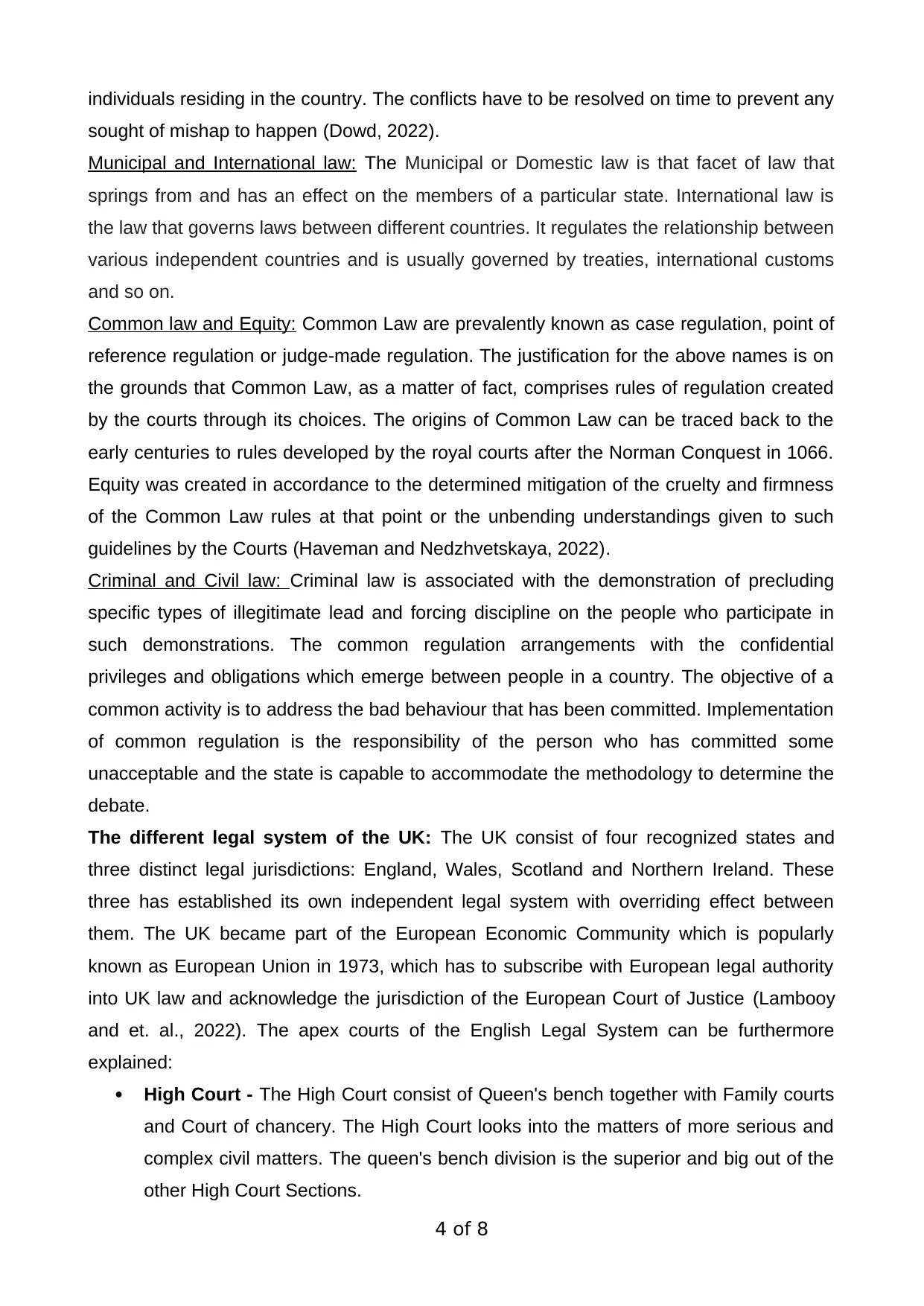
individuals residing in the country. The conflicts have to be resolved on time to prevent any
sought of mishap to happen (Dowd, 2022).
Municipal and International law: The Municipal or Domestic law is that facet of law that
springs from and has an effect on the members of a particular state. International law is
the law that governs laws between different countries. It regulates the relationship between
various independent countries and is usually governed by treaties, international customs
and so on.
Common law and Equity: Common Law are prevalently known as case regulation, point of
reference regulation or judge-made regulation. The justification for the above names is on
the grounds that Common Law, as a matter of fact, comprises rules of regulation created
by the courts through its choices. The origins of Common Law can be traced back to the
early centuries to rules developed by the royal courts after the Norman Conquest in 1066.
Equity was created in accordance to the determined mitigation of the cruelty and firmness
of the Common Law rules at that point or the unbending understandings given to such
guidelines by the Courts (Haveman and Nedzhvetskaya, 2022).
Criminal and Civil law: Criminal law is associated with the demonstration of precluding
specific types of illegitimate lead and forcing discipline on the people who participate in
such demonstrations. The common regulation arrangements with the confidential
privileges and obligations which emerge between people in a country. The objective of a
common activity is to address the bad behaviour that has been committed. Implementation
of common regulation is the responsibility of the person who has committed some
unacceptable and the state is capable to accommodate the methodology to determine the
debate.
The different legal system of the UK: The UK consist of four recognized states and
three distinct legal jurisdictions: England, Wales, Scotland and Northern Ireland. These
three has established its own independent legal system with overriding effect between
them. The UK became part of the European Economic Community which is popularly
known as European Union in 1973, which has to subscribe with European legal authority
into UK law and acknowledge the jurisdiction of the European Court of Justice (Lambooy
and et. al., 2022). The apex courts of the English Legal System can be furthermore
explained:
High Court - The High Court consist of Queen's bench together with Family courts
and Court of chancery. The High Court looks into the matters of more serious and
complex civil matters. The queen's bench division is the superior and big out of the
other High Court Sections.
4 of 8
sought of mishap to happen (Dowd, 2022).
Municipal and International law: The Municipal or Domestic law is that facet of law that
springs from and has an effect on the members of a particular state. International law is
the law that governs laws between different countries. It regulates the relationship between
various independent countries and is usually governed by treaties, international customs
and so on.
Common law and Equity: Common Law are prevalently known as case regulation, point of
reference regulation or judge-made regulation. The justification for the above names is on
the grounds that Common Law, as a matter of fact, comprises rules of regulation created
by the courts through its choices. The origins of Common Law can be traced back to the
early centuries to rules developed by the royal courts after the Norman Conquest in 1066.
Equity was created in accordance to the determined mitigation of the cruelty and firmness
of the Common Law rules at that point or the unbending understandings given to such
guidelines by the Courts (Haveman and Nedzhvetskaya, 2022).
Criminal and Civil law: Criminal law is associated with the demonstration of precluding
specific types of illegitimate lead and forcing discipline on the people who participate in
such demonstrations. The common regulation arrangements with the confidential
privileges and obligations which emerge between people in a country. The objective of a
common activity is to address the bad behaviour that has been committed. Implementation
of common regulation is the responsibility of the person who has committed some
unacceptable and the state is capable to accommodate the methodology to determine the
debate.
The different legal system of the UK: The UK consist of four recognized states and
three distinct legal jurisdictions: England, Wales, Scotland and Northern Ireland. These
three has established its own independent legal system with overriding effect between
them. The UK became part of the European Economic Community which is popularly
known as European Union in 1973, which has to subscribe with European legal authority
into UK law and acknowledge the jurisdiction of the European Court of Justice (Lambooy
and et. al., 2022). The apex courts of the English Legal System can be furthermore
explained:
High Court - The High Court consist of Queen's bench together with Family courts
and Court of chancery. The High Court looks into the matters of more serious and
complex civil matters. The queen's bench division is the superior and big out of the
other High Court Sections.
4 of 8
Paraphrase This Document
Need a fresh take? Get an instant paraphrase of this document with our AI Paraphraser
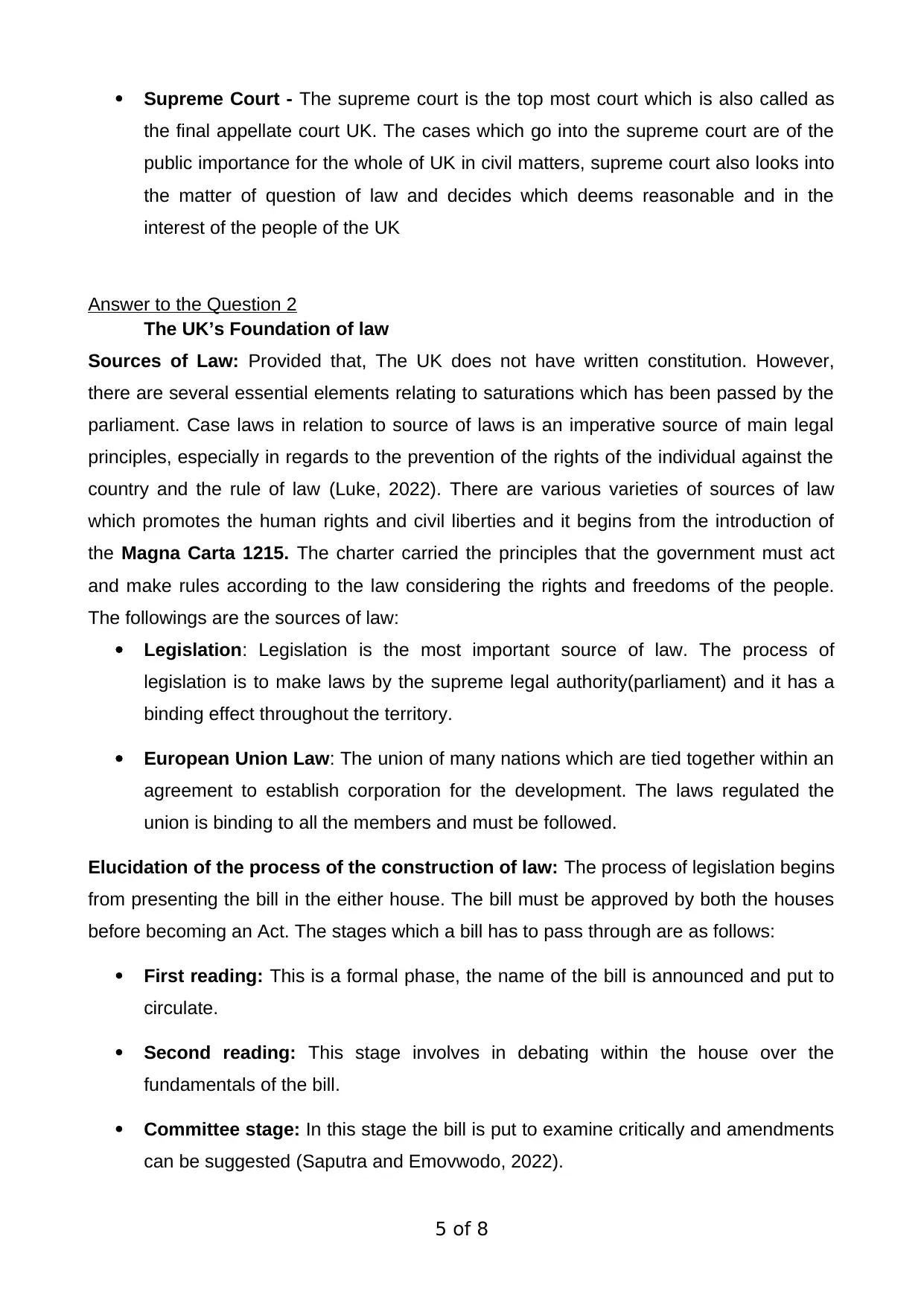
Supreme Court - The supreme court is the top most court which is also called as
the final appellate court UK. The cases which go into the supreme court are of the
public importance for the whole of UK in civil matters, supreme court also looks into
the matter of question of law and decides which deems reasonable and in the
interest of the people of the UK
Answer to the Question 2
The UK’s Foundation of law
Sources of Law: Provided that, The UK does not have written constitution. However,
there are several essential elements relating to saturations which has been passed by the
parliament. Case laws in relation to source of laws is an imperative source of main legal
principles, especially in regards to the prevention of the rights of the individual against the
country and the rule of law (Luke, 2022). There are various varieties of sources of law
which promotes the human rights and civil liberties and it begins from the introduction of
the Magna Carta 1215. The charter carried the principles that the government must act
and make rules according to the law considering the rights and freedoms of the people.
The followings are the sources of law:
Legislation: Legislation is the most important source of law. The process of
legislation is to make laws by the supreme legal authority(parliament) and it has a
binding effect throughout the territory.
European Union Law: The union of many nations which are tied together within an
agreement to establish corporation for the development. The laws regulated the
union is binding to all the members and must be followed.
Elucidation of the process of the construction of law: The process of legislation begins
from presenting the bill in the either house. The bill must be approved by both the houses
before becoming an Act. The stages which a bill has to pass through are as follows:
First reading: This is a formal phase, the name of the bill is announced and put to
circulate.
Second reading: This stage involves in debating within the house over the
fundamentals of the bill.
Committee stage: In this stage the bill is put to examine critically and amendments
can be suggested (Saputra and Emovwodo, 2022).
5 of 8
the final appellate court UK. The cases which go into the supreme court are of the
public importance for the whole of UK in civil matters, supreme court also looks into
the matter of question of law and decides which deems reasonable and in the
interest of the people of the UK
Answer to the Question 2
The UK’s Foundation of law
Sources of Law: Provided that, The UK does not have written constitution. However,
there are several essential elements relating to saturations which has been passed by the
parliament. Case laws in relation to source of laws is an imperative source of main legal
principles, especially in regards to the prevention of the rights of the individual against the
country and the rule of law (Luke, 2022). There are various varieties of sources of law
which promotes the human rights and civil liberties and it begins from the introduction of
the Magna Carta 1215. The charter carried the principles that the government must act
and make rules according to the law considering the rights and freedoms of the people.
The followings are the sources of law:
Legislation: Legislation is the most important source of law. The process of
legislation is to make laws by the supreme legal authority(parliament) and it has a
binding effect throughout the territory.
European Union Law: The union of many nations which are tied together within an
agreement to establish corporation for the development. The laws regulated the
union is binding to all the members and must be followed.
Elucidation of the process of the construction of law: The process of legislation begins
from presenting the bill in the either house. The bill must be approved by both the houses
before becoming an Act. The stages which a bill has to pass through are as follows:
First reading: This is a formal phase, the name of the bill is announced and put to
circulate.
Second reading: This stage involves in debating within the house over the
fundamentals of the bill.
Committee stage: In this stage the bill is put to examine critically and amendments
can be suggested (Saputra and Emovwodo, 2022).
5 of 8
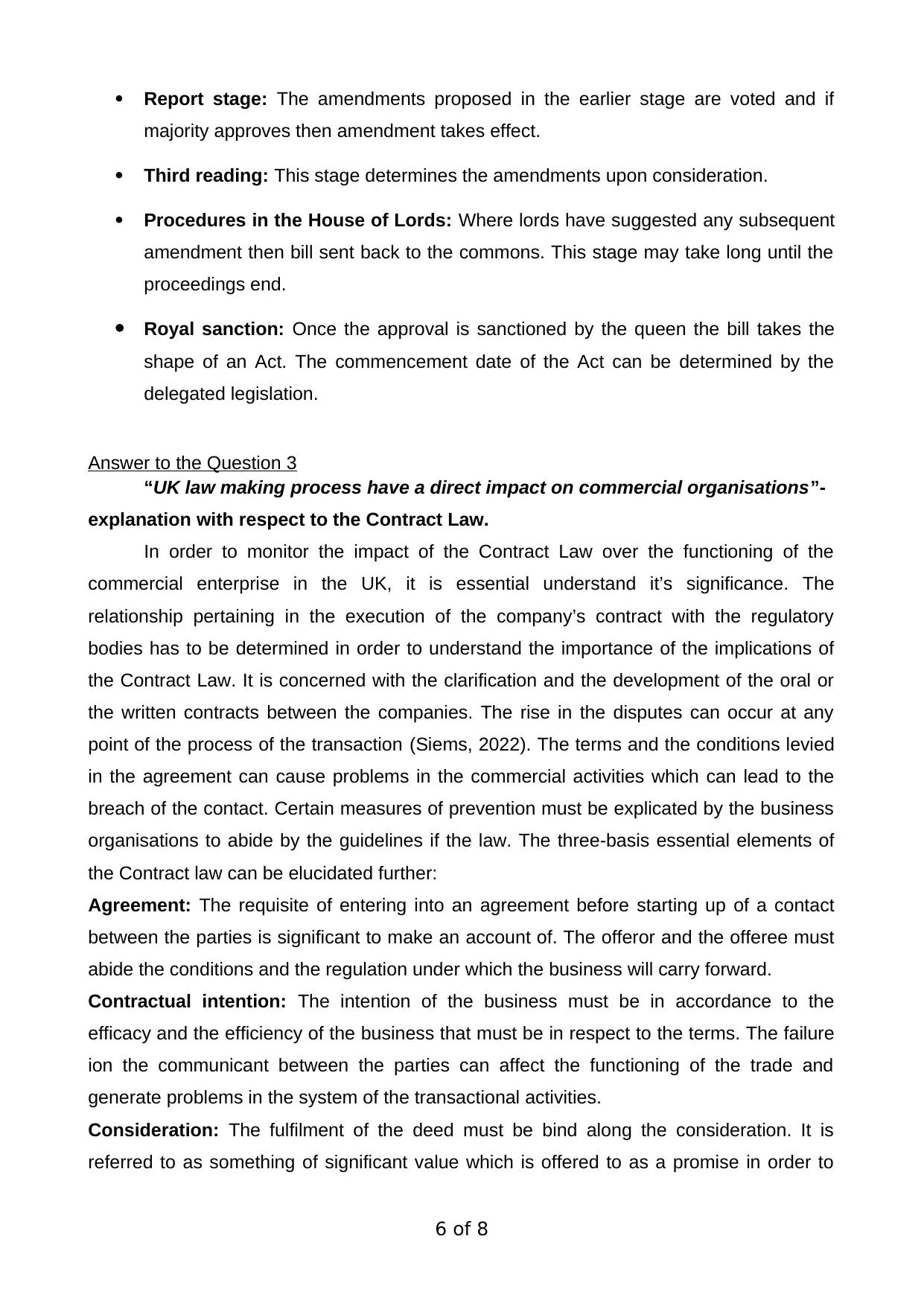
Report stage: The amendments proposed in the earlier stage are voted and if
majority approves then amendment takes effect.
Third reading: This stage determines the amendments upon consideration.
Procedures in the House of Lords: Where lords have suggested any subsequent
amendment then bill sent back to the commons. This stage may take long until the
proceedings end.
Royal sanction: Once the approval is sanctioned by the queen the bill takes the
shape of an Act. The commencement date of the Act can be determined by the
delegated legislation.
Answer to the Question 3
“UK law making process have a direct impact on commercial organisations”-
explanation with respect to the Contract Law.
In order to monitor the impact of the Contract Law over the functioning of the
commercial enterprise in the UK, it is essential understand it’s significance. The
relationship pertaining in the execution of the company’s contract with the regulatory
bodies has to be determined in order to understand the importance of the implications of
the Contract Law. It is concerned with the clarification and the development of the oral or
the written contracts between the companies. The rise in the disputes can occur at any
point of the process of the transaction (Siems, 2022). The terms and the conditions levied
in the agreement can cause problems in the commercial activities which can lead to the
breach of the contact. Certain measures of prevention must be explicated by the business
organisations to abide by the guidelines if the law. The three-basis essential elements of
the Contract law can be elucidated further:
Agreement: The requisite of entering into an agreement before starting up of a contact
between the parties is significant to make an account of. The offeror and the offeree must
abide the conditions and the regulation under which the business will carry forward.
Contractual intention: The intention of the business must be in accordance to the
efficacy and the efficiency of the business that must be in respect to the terms. The failure
ion the communicant between the parties can affect the functioning of the trade and
generate problems in the system of the transactional activities.
Consideration: The fulfilment of the deed must be bind along the consideration. It is
referred to as something of significant value which is offered to as a promise in order to
6 of 8
majority approves then amendment takes effect.
Third reading: This stage determines the amendments upon consideration.
Procedures in the House of Lords: Where lords have suggested any subsequent
amendment then bill sent back to the commons. This stage may take long until the
proceedings end.
Royal sanction: Once the approval is sanctioned by the queen the bill takes the
shape of an Act. The commencement date of the Act can be determined by the
delegated legislation.
Answer to the Question 3
“UK law making process have a direct impact on commercial organisations”-
explanation with respect to the Contract Law.
In order to monitor the impact of the Contract Law over the functioning of the
commercial enterprise in the UK, it is essential understand it’s significance. The
relationship pertaining in the execution of the company’s contract with the regulatory
bodies has to be determined in order to understand the importance of the implications of
the Contract Law. It is concerned with the clarification and the development of the oral or
the written contracts between the companies. The rise in the disputes can occur at any
point of the process of the transaction (Siems, 2022). The terms and the conditions levied
in the agreement can cause problems in the commercial activities which can lead to the
breach of the contact. Certain measures of prevention must be explicated by the business
organisations to abide by the guidelines if the law. The three-basis essential elements of
the Contract law can be elucidated further:
Agreement: The requisite of entering into an agreement before starting up of a contact
between the parties is significant to make an account of. The offeror and the offeree must
abide the conditions and the regulation under which the business will carry forward.
Contractual intention: The intention of the business must be in accordance to the
efficacy and the efficiency of the business that must be in respect to the terms. The failure
ion the communicant between the parties can affect the functioning of the trade and
generate problems in the system of the transactional activities.
Consideration: The fulfilment of the deed must be bind along the consideration. It is
referred to as something of significant value which is offered to as a promise in order to
6 of 8
⊘ This is a preview!⊘
Do you want full access?
Subscribe today to unlock all pages.

Trusted by 1+ million students worldwide
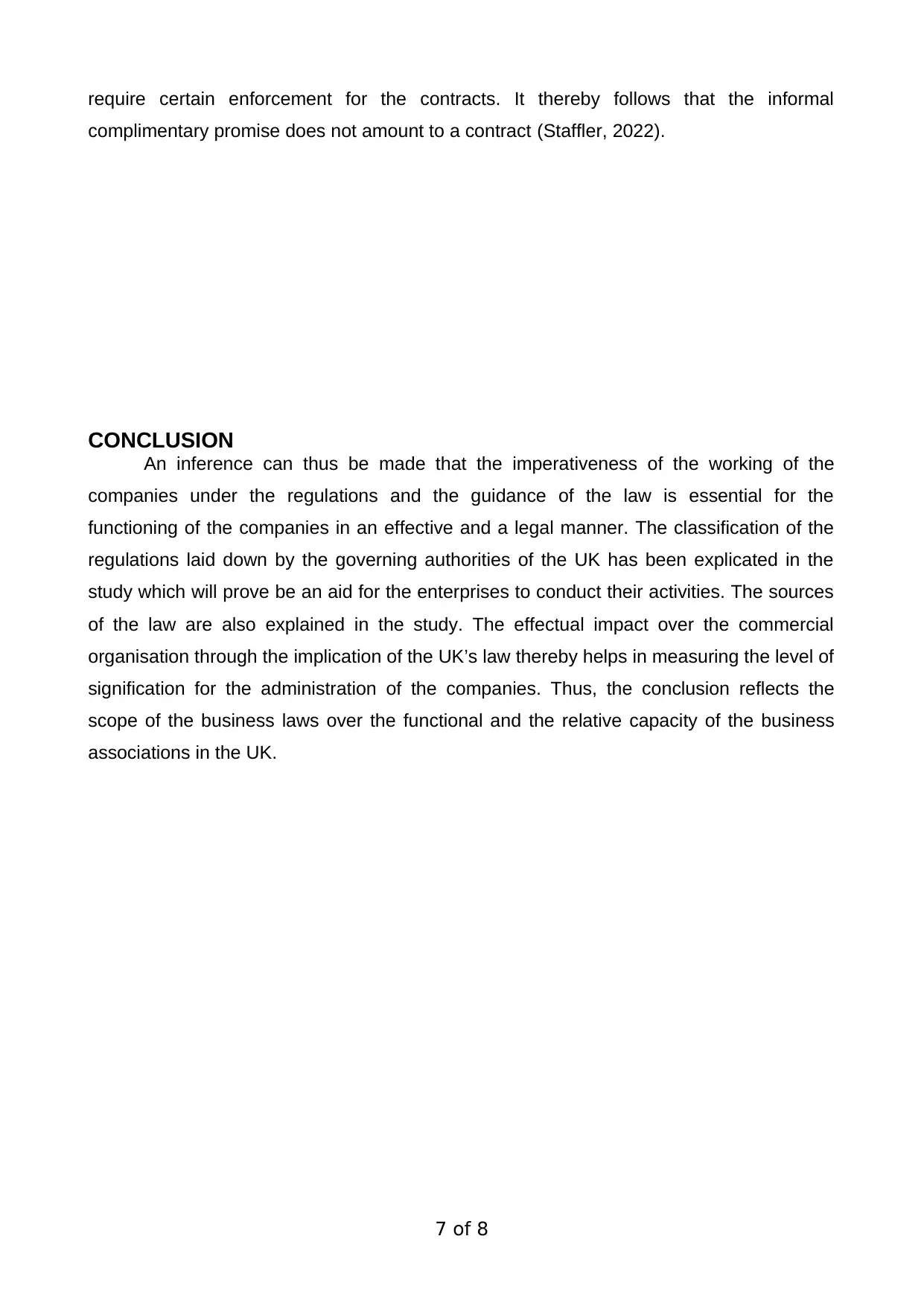
require certain enforcement for the contracts. It thereby follows that the informal
complimentary promise does not amount to a contract (Staffler, 2022).
CONCLUSION
An inference can thus be made that the imperativeness of the working of the
companies under the regulations and the guidance of the law is essential for the
functioning of the companies in an effective and a legal manner. The classification of the
regulations laid down by the governing authorities of the UK has been explicated in the
study which will prove be an aid for the enterprises to conduct their activities. The sources
of the law are also explained in the study. The effectual impact over the commercial
organisation through the implication of the UK’s law thereby helps in measuring the level of
signification for the administration of the companies. Thus, the conclusion reflects the
scope of the business laws over the functional and the relative capacity of the business
associations in the UK.
7 of 8
complimentary promise does not amount to a contract (Staffler, 2022).
CONCLUSION
An inference can thus be made that the imperativeness of the working of the
companies under the regulations and the guidance of the law is essential for the
functioning of the companies in an effective and a legal manner. The classification of the
regulations laid down by the governing authorities of the UK has been explicated in the
study which will prove be an aid for the enterprises to conduct their activities. The sources
of the law are also explained in the study. The effectual impact over the commercial
organisation through the implication of the UK’s law thereby helps in measuring the level of
signification for the administration of the companies. Thus, the conclusion reflects the
scope of the business laws over the functional and the relative capacity of the business
associations in the UK.
7 of 8
Paraphrase This Document
Need a fresh take? Get an instant paraphrase of this document with our AI Paraphraser
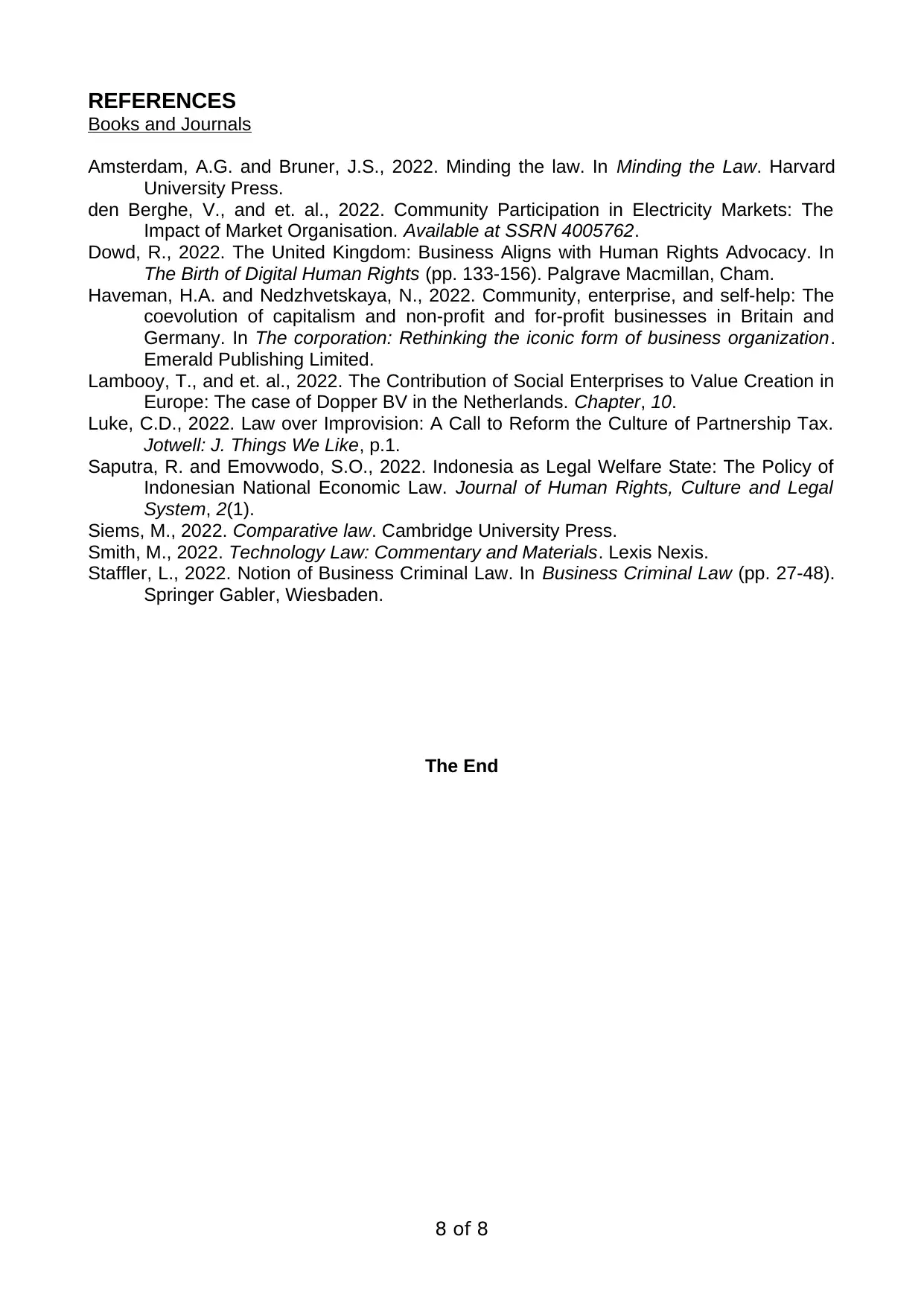
REFERENCES
Books and Journals
Amsterdam, A.G. and Bruner, J.S., 2022. Minding the law. In Minding the Law. Harvard
University Press.
den Berghe, V., and et. al., 2022. Community Participation in Electricity Markets: The
Impact of Market Organisation. Available at SSRN 4005762.
Dowd, R., 2022. The United Kingdom: Business Aligns with Human Rights Advocacy. In
The Birth of Digital Human Rights (pp. 133-156). Palgrave Macmillan, Cham.
Haveman, H.A. and Nedzhvetskaya, N., 2022. Community, enterprise, and self-help: The
coevolution of capitalism and non-profit and for-profit businesses in Britain and
Germany. In The corporation: Rethinking the iconic form of business organization.
Emerald Publishing Limited.
Lambooy, T., and et. al., 2022. The Contribution of Social Enterprises to Value Creation in
Europe: The case of Dopper BV in the Netherlands. Chapter, 10.
Luke, C.D., 2022. Law over Improvision: A Call to Reform the Culture of Partnership Tax.
Jotwell: J. Things We Like, p.1.
Saputra, R. and Emovwodo, S.O., 2022. Indonesia as Legal Welfare State: The Policy of
Indonesian National Economic Law. Journal of Human Rights, Culture and Legal
System, 2(1).
Siems, M., 2022. Comparative law. Cambridge University Press.
Smith, M., 2022. Technology Law: Commentary and Materials. Lexis Nexis.
Staffler, L., 2022. Notion of Business Criminal Law. In Business Criminal Law (pp. 27-48).
Springer Gabler, Wiesbaden.
The End
8 of 8
Books and Journals
Amsterdam, A.G. and Bruner, J.S., 2022. Minding the law. In Minding the Law. Harvard
University Press.
den Berghe, V., and et. al., 2022. Community Participation in Electricity Markets: The
Impact of Market Organisation. Available at SSRN 4005762.
Dowd, R., 2022. The United Kingdom: Business Aligns with Human Rights Advocacy. In
The Birth of Digital Human Rights (pp. 133-156). Palgrave Macmillan, Cham.
Haveman, H.A. and Nedzhvetskaya, N., 2022. Community, enterprise, and self-help: The
coevolution of capitalism and non-profit and for-profit businesses in Britain and
Germany. In The corporation: Rethinking the iconic form of business organization.
Emerald Publishing Limited.
Lambooy, T., and et. al., 2022. The Contribution of Social Enterprises to Value Creation in
Europe: The case of Dopper BV in the Netherlands. Chapter, 10.
Luke, C.D., 2022. Law over Improvision: A Call to Reform the Culture of Partnership Tax.
Jotwell: J. Things We Like, p.1.
Saputra, R. and Emovwodo, S.O., 2022. Indonesia as Legal Welfare State: The Policy of
Indonesian National Economic Law. Journal of Human Rights, Culture and Legal
System, 2(1).
Siems, M., 2022. Comparative law. Cambridge University Press.
Smith, M., 2022. Technology Law: Commentary and Materials. Lexis Nexis.
Staffler, L., 2022. Notion of Business Criminal Law. In Business Criminal Law (pp. 27-48).
Springer Gabler, Wiesbaden.
The End
8 of 8
1 out of 8
Related Documents
Your All-in-One AI-Powered Toolkit for Academic Success.
+13062052269
info@desklib.com
Available 24*7 on WhatsApp / Email
![[object Object]](/_next/static/media/star-bottom.7253800d.svg)
Unlock your academic potential
Copyright © 2020–2025 A2Z Services. All Rights Reserved. Developed and managed by ZUCOL.


